|






Click the flag
Meet our special
U.S. Publishers
|
The
Early Years
Featured
Books in this Category /Main
Booklist

Featured
Books
|
Amazing
Baby. Desmond Morris, $24.95
This insightful and beautiful reference
follows the biology, physics, chemistry and other sciences that
drive the rapid changes that occur daily in babies. |
|
The
Amazing Infant. Tiffany Field, $39.99
Tiffany Field takes the reader on a wonderful
journey, as she combines research, theory and real-life experiences
to create this comprehensive and enjoyable guide to infant development.
|
|
Amazing Minds: from Newborns to Toddlers. Jan Faull & Jennifer McLean Oliver, $18.50
The science of nurturing your child’s developing mind with games, activities and more. |
Back to top
|
The Attachment
Connection: Parenting a Secure & Confident Child Using the Science
of Attachment Theory. Ruth Newton, $24.95
The Attachment Connection sorts
out the facts from the fiction about parent-child attachment and
shows how paying attention to the emotional needs of your child,
particularly during the first five years of development, can help
him or her grow up happy, secure, and confident. You'll discover
how your child's brain is developing at each stage of growth and
learn to use reasonable, easy-to-implement guidelines based on sound
science to foster secure attachment, healthy social skills, and
emotional regulation in your child.
|
|
Babies
in Mind: Understanding Your Baby’s Psychological Needs.
Jenny Perkel, $20.95
Being a new parent is immensely challenging.
Not only do you have to handle your baby's physical needs, but her
psychological needs too. Babies in Mind explains how to
give babies what they really need from a purely psychological perspective.
Written for parents, the book is informed by psychological and medical
research which shows that the way in which babies are handled and
related to by their caregivers has a direct and powerful link to
the kind of people they will grow into. |
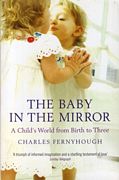
|
The Baby in the Mirror: a Child’s World from Birth to Three. Charles Fernyhough, $16.95
For Charles Fernyhough, the birth of his daughter Athena was an opportunity to view the psychological development and growth of a child first hand. Integrating scientific research with careful observation and questioning, this unique study investigates what it is like to be a newborn baby, an infant on the threshold of language, and a toddler testing out autonomy. Using Athena as a case study, Fernyhough vividly describes the huge amount of mental work children undertake right from birth. En route, he explains in simple terminology the ideas of the great child psychologists — including Vygotsky, Piaget, and Bowlby — and introduces some of the latest neuroscientific and developmental research. Written with a father’s tenderness and a keen scientific eye, this funny, touching, and fascinating investigation will allow parents and all those interested by child development to understand the extraordinary journey a child makes during the first three years of life. |
Back to top
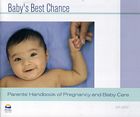
|
Baby’s
Best Chance: Parent’s Handbook of Pregnancy and Baby Care, Sixth
Edition. Province of British Columbia, Ministry for Children
and Families, $15.95
This easy-to read, well-illustrated handbook
offers answers to common and not-so-common questions about pregnancy,
birth and taking care of baby in the first six months of life. |
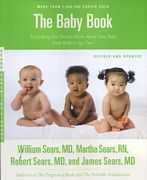
|
The Baby Book: Everything You Need to
Know About Your Baby from Birth to Age Two, Revised 2013. William Sears, Martha Sears, Robert Sears & James Sears, $29.00
An encyclopedic guide to your baby’s
development and care in the first two years, this popular baby care book provides
comprehensive information on virtually every aspect of infant care. The Baby Book is a rich and invaluable resource that will help you and your baby grow
together. |
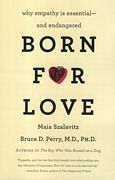
|
Born for Love: Why
Empathy is Essential — and Endangered. Maia Szalavitz
& Bruce Perry, $19.99
Born for Love examines how empathy develops — or fails to develop — from birth through adulthood and what we can do to increase this vital capacity to love and care both among our children and in society.
|

|
The Brightening
Glance: Imagination and Childhood. Ellen Handler Spitz,
$19.95
In this remarkable book, Ellen Handler
Spitz shows how to promote children’s creative and emotional growth
by making the most of the unlimited possibilities of everyday experiences.
Through delightful anecdotes about real children and their treasures,
bedrooms, play spaces, music, scary things, and birthday parties,
The Brightening Glance will inspire you to create a life
of wonder, inventiveness, and cultural enrichment for your child. |
Back to top

|
Caring
for Infants and Toddlers in Groups: Developmentally Appropriate
Practice (2nd Edition). ZERO
TO THREE, $43.95
Featuring an age-based approach to link developmental milestones
to positive learning experiences and filled with research-based
information, this guide outlines ways infant care teachers in both
center-based and family child care programs can positively impact
the learning and lives of the children and families they serve. |
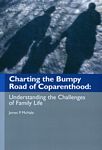
|
Charting
the Bumpy Road of Coparenthood: Understanding the Challenges
of Family Life. James McHale, $39.50
Filled with interviews with new parents
and observations of new parents and their babies, this major new
study offers key information that clinicians, policymakers, and
parents need to know about creating consistent and coordinated co-parenting
strategies during pregnancy and in a child’s earliest years.
Author James McHale, explains how parents work together—or
don’t—to care for infants and young children, and how
the quality of their co-parenting alliance affects toddlers’
social and emotional development. |
|
Child Development: Theories and Critical Perspectives,
2nd Edition. Rosalyn Shute & Phillip Slee, $75.95
Child Development: Theories and Critical
Perspectives provides an engaging and perceptive overview of both well-established
and recent theories in child and adolescent psychology. This unique summary of
traditional scientific perspectives alongside critical post-modern thinking
will provide readers with a sense of the historical development of different
schools of thought. The authors also place theories of child development in
philosophical and cultural contexts, explore links between them, and consider
the implications of theory for practice in the light of the latest thinking and
developments in implementation and translational science.
Child Development: Theories and Critical
Perspectives will be essential reading for students on advanced
courses in developmental psychology, education, social work and social policy,
and the lucid style will also make it accessible to readers with little or no
background in psychology. |
Back to top
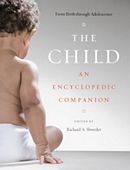
|
The Child:
an Encyclopedic Companion from Birth through Adolescence.
Richard A. Shweder, Editor in Chief, $90.50
The Child: an Encyclopedic Companion offers
both parents and professionals access to the best scholarship
from all areas of child studies in a remarkable one-volume
reference. Bringing together contemporary research on children
and childhood from pediatrics, child psychology, childhood
studies, education, sociology, history, law, anthropology,
and other related areas, The Child contains more than
500 articles — all written by experts in their fields.
It is an unparalleled resource for parents, social workers,
researchers, educators, and others who work with children. |
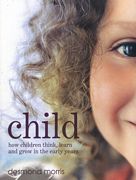
|
Child: How Children Think, Learn and Grow in the Early Years. Desmond Morris, $35.99
Anthropologist Desmond Morris explores the world of young children aged from 2 to 5 as they emerge from toddlerhood and start out on the long road to independence. These early years are a time when the capacities for learning and sheer exuberance for life are unparalleled.
This insightful guide contains a wealth of information about all aspects of development. Age-by-stage profiles describe growth patterns, social and emotional behavior, physical and cognitive skills. Gestures and body language are interpreted to guide the reader to a better understanding of personality and what young children are thinking and feeling. Enchanting photographs capture typical actions and reactions to everyday experiences. |
|
|
Communicating with Children Birth to Four Years. Debbie
Chalmers, $50.30
Developing Children’s Communication from Birth to Four
Years is an encouraging guide for practitioners and students working with
young children in the Early Years Foundation Stage, which will also appeal to
parents and family carers. Providing a clear outline of children’s needs,
responses and abilities at each developmental stage, it guides the reader on:
- how to recognise and predict children’s individual
feelings and reactions
- how to talk and listen to children at different stages
- how to be aware of body language and other non-verbal
forms of communication
- how to support communication for children with special
and additional needs
Offering advice, ideas and strategies for supporting
relationships and understanding in diverse settings and at home, this book is
an essential guide to developing communication and social skills in the early
years. |
Back to top
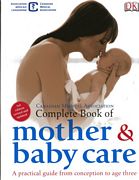
|
Complete Book of Mother & Baby Care from Conception to 3 Years, 3rd Edition. CMA (Canadian Medical Association), $30.00 
Authoritative, reassuring and practical this companion for parents on pregnancy, postpartum, infant and toddler care is illustrated with full colour photographs. This very accessible, easy-to-read guide includes a quick reference for emergencies, vital information about childhood illnesses, home safety and first aid. |
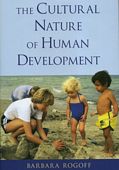
|
The Cultural Nature
of Human Development. Barbara Rogoff, $37.95
Three-year-old Kwara'ae children in Oceania act as caregivers
of their younger siblings, but in the UK, it is an offense to leave
a child under age 14 years without adult supervision. In the Efe
community in Zaire, infants routinely use machetes with safety
and some skill, although U.S. middle-class adults often do not
trust young children with knives. What explains these marked differences
in the capabilities of these children?
Until recently, traditional understandings of human development
held that a child's development is universal and that children
have characteristics and skills that develop independently of cultural
processes. Barbara Rogoff argues, however, that human development
must be understood as a cultural process, not simply a biological
or psychological one. Individuals develop as members of a community,
and their development can only be fully understood by examining
the practices and circumstances of their communities. |
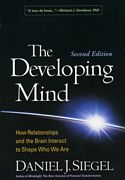
|
The Developing Mind: How
Relationships and the Brain Interact to Shape Who We Are, 2nd Edition. Daniel Siegel, $54.50
This bestselling book put the field of
interpersonal neurobiology on the map for many tens of thousands of readers.
Daniel Siegel goes beyond the nature and nurture divisions that traditionally
have constrained much of our thinking about development, exploring the role of
interpersonal experiences in forging key connections in the brain. He presents
a groundbreaking integrative framework for understanding the emergence of the
growing, feeling, communicating mind. Illuminating how and why interpersonal
neurobiology matters, this book is essential reading for clinicians, educators,
researchers, and students interested in promoting healthy development and
resilience across the lifespan. New to this edition:
- Incorporates significant scientific and
technical advances
- Expanded discussions of cutting-edge topics,
including neuroplasticity, epigenetics, mindfulness, and the neural correlates
of consciousness
- Epilogue on domains of integration — specific
pathways to well-being and therapeutic change
- Useful pedagogical features, such as diagrams
and an extensive glossary
|
Back to top

|
Evidence-Based
Practice in the Early Childhood Field. Virginia Buysse
& Patricia Wesley, Editors, $37.95
Evidence-Based Practice in the Early
Childhood Field defines the evidence-based practice movement
and explains how it is empowering professionals to deliver the most
effective interventions available. The authors examine how evidence-based
practice is changing the way research is conducted and how various
sources of evidence can be applied to solve real-world problems
and used to inform critical policy decisions. |
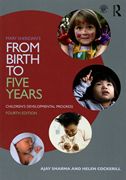
|
From Birth to Five Years: Children’s Developmental
Progress, 4th Edition. Ajay Sharma & Helen Cockerill, $37.50
The classic guide to the developmental progress of
pre-school children, FROM BIRTH TO FIVE YEARS is a valuable reference for
professionals in health care, educational and social work settings. In this
fourth edition, the text is aligned with current research and practices, and
supports assessment and management plans for understanding children's progress
within each developmental domain. |
|
|
Handbook of Attachment: Theory, Research, and Clinical
Applications, 3rd Edition. Edited by Jude Cassidy & Phillip Shaver,
$63.95
Widely regarded as the state-of-the-science reference on
attachment, this handbook interweaves theory and cutting-edge research with
clinical applications. Leading researchers examine the origins and development
of attachment theory; present biological and evolutionary perspectives; and
explore the role of attachment processes in relationships, including both
parent-child and adult romantic bonds. Implications for mental health and
psychotherapy are addressed, with reviews of exemplary attachment-oriented
interventions for children and adolescents, adults, couples, and families.
Contributors discuss best practices in assessment and critically evaluate
available instruments and protocols. New to This Edition:
- Chapters on genetics and epigenetics, psychoneuroimmunology, and
sexual mating
- Chapters on compassion, school readiness, and the caregiving
system across the lifespan
- Chapter probing the relation between attachment and other
developmental influences
- Nearly a decade's worth of theoretical and empirical advances
|
Back to top
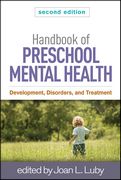
|
Handbook of Preschool Mental Health: Development,
Disorders and Treatment. Joan Luby, editor, $75.95
Comprehensively exploring the development of psychiatric
disorders in 2- to 6-year-olds, this authoritative handbook has been thoroughly
revised to incorporate important scientific and clinical advances. Leading
researchers examine how behavioral and emotional problems emerge and can be
treated effectively during this period of rapid developmental and brain
changes. Current knowledge is presented on conduct disorders,
attention-deficit/hyperactivity disorder, anxiety disorders, depressive
disorders, autism spectrum disorder, attachment disorders, and sleep disorders
in very young children. The volume reviews a range of interventions for
preschoolers and their caregivers — including clear descriptions of clinical
techniques — and discusses the strengths and limitations of the empirical
evidence base. New to this edition:
- Many new authors; extensively revised with the latest research
and empirically supported treatments
- Heightened focus on brain development and the neural correlates
of disorders
- Section on risk and resilience, including chapters on sensitive
periods of development and the early environment
- Chapters on parent-child interaction therapy,
cognitive-behavioral therapies, attachment-based therapies, and translational
approaches to early intervention
|
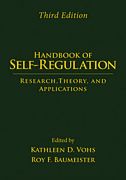
|
Handbook of Self-Regulation, 3rd Edition: Research,
Theory, and Applications. Edited by Roy Baumeister & Kathleen
Vohs, $117.50
From leading authorities, this significantly revised and
expanded handbook is a highly regarded reference in a rapidly growing field. It
thoroughly examines the conscious and unconscious processes by which people
manage their behavior and emotions, control impulses, and strive toward desired
goals. Chapters explore such vital issues as why certain individuals have
better self-control than others; how self-regulation shapes, and is shaped by,
social relationships; underlying brain mechanisms and developmental pathways;
and which interventions can improve people’s self-control. The volume also
addresses self-regulatory failures and their consequences, with chapters on
attention-deficit/hyperactivity disorder, criminality, addictions, and money
management challenges. As a special bonus, purchasers of the third edition can
download a supplemental e-book featuring two notable, highly cited chapters
from the second edition.
New to This Edition:
- Incorporates the latest topic areas, theories, and empirical
findings
- Updated throughout, with 21 new chapters and numerous new authors
- Cutting-edge topics: implicit self-regulation processes, the role
of physical needs and processes (such as the importance of sleep), the benefits
of dampening positivity, the frequency and consequences of emotional control in
the workplace, and self-regulation training
- Expanded coverage of motivational factors, romantic relationships,
and lapses of self-control
|

|
Home Visitor’s
Guidebook: Promoting Optimal Parent & Child Development, 3rd
Edition. Carol Klass, $49.50
The ultimate professional development
resource for early interventionists, social workers, therapists,
and other home visitors, this research-based guidebook is enhanced
throughout with up-to-date references and new material on today's
hot topics. |
Back to top
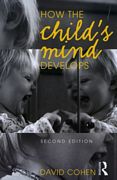
|
How the Child’s Mind Develops, 2nd Edition. David Cohen, $42.95
- How do we get from helpless baby to knowing
teenager?
- What impact do television, computers, the
internet, video games and evolving technology have on the way children's minds
develop?
- Is cognition a question of learning and
environment or of heredity?
How we learn to think, perceive,
remember, talk, reason and learn is a central topic in psychology - and one
that sees constant new research. In this very readable book, David Cohen
examines the fundamental issues of how children learn to read and write, of how
their intellectual abilities are measured and the development of their
morality. He examines child crime and looks at how modern media affect the way
the child's mind develops.
How the Child's Mind Develops is an
integrated and thought-provoking account of the central issues in child
development. Parents, professionals and students will find it an invaluable
introduction. |
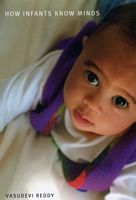
|
How Infants Know Minds. Vasudevi Reddy, $29.95
Most psychologists claim that we begin to develop a “theory of mind” — some basic ideas about other people’s minds — at age two or three, by inference, deduction, and logical reasoning.
But does this mean that small babies are unaware of minds? That they see other people simply as another (rather dynamic and noisy) kind of object? This is a common view in developmental psychology. Yet, as this book explains, there is compelling evidence that babies in the first year of life can tease, pretend, feel self-conscious, and joke with people. Using observations from infants’ everyday interactions with their families, Vasudevi Reddy argues that such early emotional engagements show infants’ growing awareness of other people’s attention, expectations, and intentions. |

|
How
Language Works: How Babies Babble, Words Change Meaning and Languages
Live or Die. David Crystal, $22.00
In this fascinating survey of everything
from how sounds become speech to how names work, David Crystal answers
every question you might ever have had about the nuts and bolts
of language in his usual highly illuminating way. Along the way
we find out about eyebrow flashes, whistling languages, how parents
teach their children to speak, how politeness travels across languages
and how the way we talk show not just how old we are but where we're
from and even who we want to be. |
Back to top
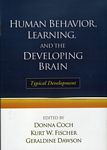
|
Human
Behavior, Learning, and the Developing Brain: Volume 1, Typical
Development. Edited by Donna Coch, Kurt Fischer & Geraldine
Dawson, $59.95
This state-of-the-science volume brings together leading authorities
from multiple disciplines to examine the relationship between brain
development and behavior in typically developing children. Chapters
explore the complex interplay of neurobiological and environmental
influences in the development of memory, language, reading, inhibitory
control, and other core aspects of cognitive, emotional, and social
functioning. Throughout, the volume gives particular attention to
what the research reveals about ways to support all children's learning
and healthy development. |
|
Human
Behavior, Learning, and the Developing Brain: Volume 2, Atypical
Development. Edited by Donna Coch, Geraldine Dawson &
Kurt W. Fischer, $59.95
Synthesizing the breadth of current knowledge
on brain-behavior relationships in atypically developing children,
this important volume integrates theories and data from multiple
disciplines. Leading authorities present their latest research on
specific clinical problems, including autism, Williams syndrome,
learning and language disabilities, ADHD, and issues facing infants
of diabetic mothers. In addition, the effects of social stress and
maltreatment on brain development and behavior are thoroughly reviewed.
Demonstrating the uses of cutting-edge methods from developmental
neuroscience, developmental psychology, and cognitive science, the
contributors emphasize the implications of their findings for real-world
educational and clinical practices. |
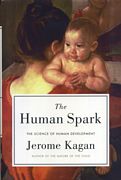
|
The Human Spark: the Science of Human
Development. Jerome Kagan, $32.00
As infants we are rife with potential.
For a short time, we have before us a seemingly infinite number of
developmental paths. Soon, however, we become limited to certain paths as we
grow into unique products of our genetics and experience. But what factors
account for the variation—in skills, personalities, values—that results? How do
experiences shape what we bring into the world? In The Human Spark, pioneering
psychologist Jerome Kagan offers an unflinching examination of personal, moral,
and cultural development, and explores the tension between biology and the
environment. He reviews major advances in the science of development over the
past three decades and offers pointed critiques and new syntheses. Most
importantly, he reminds us that a life, however influenced by biology and
upbringing, is still a tapestry to be woven, not an outcome to be endured.
Whether the reader is a first-time parent; an educator; or simply a curious
soul seeking self-knowledge, Kagan makes an expert and companionable guide. |
Back to top
|
The Infant Mind: Origins of the
Social Brain. Edited by Maria Legerstee, David
Haley & Marc Bornstein, $90.95 
Integrating cutting-edge research from
multiple disciplines, this book provides a dynamic and holistic picture of the
developing infant mind. Contributors explore the transactions among genes, the
brain, and the environment in the earliest years of life. The volume probes the
neural correlates of core sensory, perceptual, cognitive, emotional, and social
capacities. It highlights the importance of early relationships, presenting
compelling findings on how parent–infant interactions influence neural
processing and brain maturation. Innovative research methods are discussed,
including applications of behavioral, hormonal, genetic, and brain imaging
technologies. |
|
Is
This a Phase? Child Development & Parent Strategies, Birth to
6 Years. Helen Neville, $29.95
This reassuring and practical guide explains
what to expect at every developmental stage between birth and age
6. Pediatric nurse and parent educator Helen Neville walks parents
and caregivers through three dozen topics common in the first six
years of life. Accurate, reliable and authoritative, Is This
a Phase looks at child development and temperament and how
they affect the family. |
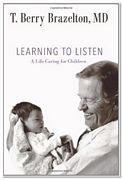
|
Learning to Listen: a Life Caring for Children. T. Berry Brazelton, $27.50
From his childhood in Waco, Texas, where
he took expert care of nine small cousins while the adults ate Sunday lunch, to
Princeton and an offer from Broadway, to medical and psychoanalytic training,
to the exquisite observations into newborn behavior that led babies to be seen
in an entirely new light, Dr. T. Berry Brazelton’s life has been one of
innovation and caring. Known internationally for the Touchpoints theory of
regression and growth in infants and young children, Brazelton is also credited
for bringing the insights of child development into pediatrics, and for his
powerful advocacy in Congress. In Learning to Listen, fans of Brazelton
and professionals in his field can follow both the roots of a brilliant career
and the evolution of child-rearing into the twenty-first century. |
Back to top
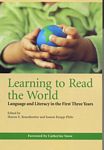
|
Learning
to Read the World: Language and Literacy in the First Three Years.
Sharon Rosenkoetter & Joanne Knapp-Philo, editors, $45.95
Infants and toddlers typically learn
to read the world by getting support and encouragement from parents
and caregivers — the cherished adults who are an essential part of
their day-to-day routines and interactions. Learning to Read
the World draws on research from multiple fields to explore
infant-toddler learning as it relates to beginning language and
literacy. By including a multidisciplinary array of authors, Rosenkoetter
and Knapp-Philo provide a broad understanding of how very young
children move toward literacy and suggest ways that readers can
encourage young children to delight in words, shapes, sounds, symbols,
concepts, and other facets of language and literacy development. |

|
The Long Shadow of Temperament. Jerome Kagan & Nancy Snidman, $24.95
In The Long Shadow of Temperament, Kagan and Nancy Snidman summarize the results of a unique inquiry into human temperaments, one of the best-known longitudinal studies in developmental psychology. In a masterly summary of their wide-ranging exploration, Kagan and Snidman demonstrate that while temperamental tendencies can be modified by experience, the shadow of temperament is permanently cast over psychological development. |
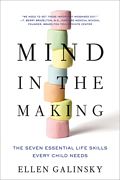
|
Mind in the Making:
the Seven Essential Life Skills Every Child Needs. Ellen Galinsky,
$21.00
There are hundreds of books that give parents advice on everything from weaning to toilet training, from discipline to nutrition. But in spite of this overwhelming amount of information, there is very little research-based advice for parents on how to raise their children to be well rounded and achieve their full potential, helping them learn to take on life's challenges, communicate well with others, and remain committed to learning. These are the "essential life skills" that Ellen Galinsky has spent her career pursuing, through her own studies and through decades of talking with more than a hundred of the most outstanding researchers in child development and neuroscience. The good news is that there are simple everyday things that all parents can do to build these skills in their children for today and for the future. They don't cost money, and it's never too late to begin. |
Back to top
| |
Pathways to Competence
for Young Children: a Parenting Program (Book and CD-ROM).
Sarah Landy & Elizabeth Thompson, $79.95 
With Pathways to Competence for Young
Children: a Parenting Program, professionals can help parents
understand and manage their child’s behavior and take an active
role in guiding social-emotional development. Developed from Sarah
Landy’s highly regarded child development book, Pathways to
Competence, this manual-and-CD set shows how to set up, lead,
and evaluate a parenting program for parents of children from birth
to age 7. This one-of-a-kind program is:
- Proven effective.
Field tested for 10 years with hundreds of parents, this program
has proved highly successful in improving child behavior and enhancing
parenting skills.
- Hands-on and practical.
Professionals will learn how to lead group discussions, activities
and exercises, and role-plays on key parenting challenges.
- Versatile. Materials
can be used for a 10-, 15-, or 20-week parenting group, and professionals
can tailor the program to suit their needs. The program is appropriate
for a wide range of audiences, including parents with depression,
teen mothers, and parents of children with behavior problems.
Everything professionals need to conduct
a Pathways to Competence Parenting Group is included: more
than 140 parent handouts (easy to print from the CD-ROM inside this
book), instructions on structuring and leading sessions, problem-solving
tips, and evaluation guidelines. With this engaging and effective
program, parents will discover how to strengthen their relationships
with their children and foster the healthy social-emotional development
children need to manage life’s challenges. |
|
|
Pathways to Positive Parenting: Helping Parents
Nurture Healthy Development in the Earliest Months. Jolene Pearson, $55.50
An essential resource for all professionals who work with
families of infants, this valuable handbook serves as a parent educator’s guide
to coaching and supporting new parents.
The curriculum provides professionals with innovative
teaching techniques, and practical and effective strategies that are
field-tested, science-based and can be applied immediately in work supporting
the development of positive parenting skills. The book also includes
information on important topics such as postpartum depression, tummy time,
breastfeeding, safe sleep, and coping with crying. |
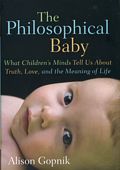
|
The Philosophical
Baby: What Children’s Minds Tell Us about Truth, Love and
the Meaning of Life. Alison Gopnik, $19.00
For most of us, having a baby is the most profound,
intense, and fascinating experience of our lives. Now scientists
and philosophers are starting to appreciate babies, too. The last
decade has witnessed a revolution in our understanding of infants
and young children. Scientists used to believe that babies were
irrational, and that their thinking and experience were limited.
Recently, they have discovered that babies learn more, create more,
care more, and experience more than we could ever have imagined.
And there is good reason to believe that babies are actually smarter,
more thoughtful, and even more conscious than adults.
Alison Gopnik — a leading psychologist and
philosopher, as well as a mother — explains the groundbreaking
new psychological, neuroscientific, and philosophical developments
in our understanding of very young children, transforming our understanding
of how babies see the world and in turn promoting a deeper appreciation
for the role of parents. |
Back to top
|
Raising a Secure Child: How Circle of Security
Parenting Can Help You Nurture Your Child's Attachment, Emotional Resilience,
and Freedom to Explore. Kent Hoffman, Glen Cooper & Bert Powell, $21.95
Today's parents are constantly pressured to be perfect.
But in striving to do everything right, we risk missing what children really
need for lifelong emotional security. Now the simple, powerful "Circle of
Security" parenting strategies that Kent Hoffman, Glen Cooper, and Bert
Powell have taught thousands of families are available in self-help form for
the first time. You will learn:
- How to balance nurturing and protectiveness with promoting your
child's independence
- What emotional needs a toddler or older child may be expressing
through difficult behavior
- How your own upbringing affects your parenting style — and what you
can do about it
Filled with vivid stories and unique practical tools,
this book puts the keys to healthy attachment within everyone's
reach — self-understanding, flexibility, and the willingness to make and learn
from mistakes. |
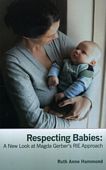
|
Respecting Babies: a New Look at Magda Gerber’s RIE Approach. Ruth Anne Hammond, $34.50
Respecting Babies will help parents and caregivers provide support to babies and toddlers in a way that allows children to become confident explorers and learners. Focusing on the importance of building secure relationships, this book is an engaging and easy-to-read summary of the history and methods of care conceived by Magda Gerber, founder of the Resources for Educarers (RIS) Program. |
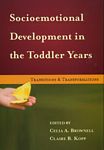
|
Socioemotional
Development in the Toddler Years: Transitions and Transformations.
Edited by Celia Brownell & Claire Kopp, $71.95
This volume explores the key developmental transitions that take
place as 1 to 3 year-olds leave infancy behind and begin to develop
the social and emotional knowledge, skills, and regulatory abilities
of early childhood. Leading investigators examine the multiple,
interacting factors that lead to socioemotional competence in this
pivotal period, covering both typical and atypical development.
|
Back to top
|
A Therapist's Guide to Child Development: the
Extraordinarily Normal Years. Edited by Dee Cray, $62.50
A Therapist's Guide to Child Development gives
therapists and counselors the basics they need to understand their clients in
the context of development and to explain development to parents. The chapters
take the reader through the various physical, social, and identity developments
occurring at each age, explaining how each stage of development is closely
linked to mental health and how that is revealed in therapy. This ideal guide
for students, as well as early and experienced professionals, will also give
readers the tools to communicate successfully with the child’s guardians or
teachers, including easy-to-read handouts that detail what kind of behaviors
are not cause for concern and which behaviors mean it’s time to seek help. As
an aid to practitioners, this book matches developmental ages with appropriate,
evidence-based mental health interventions. |
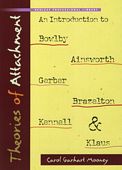
|
Theories of Attachment:
an Introduction to Bowlby, Ainsworth, Gerber, Brazelton, Kennell
& Klaus. Carol Garhart Mooney, $28.95
Theories of Attachment provides
a solid foundation for informed early childhood care and
is a terrific resource for anyone working with young children.
It thoroughly covers the background and research of the
prominent minds of attachment theorists John Bowlby, Mary
Ainsworth, Magda Gerber, John Kennell, Marshall Klaus, and
T. Berry Brazelton
— including the theory keystones of bonding, separation,
and crying. |

|
Theories
of Infant Development. Gavin Bremner & Alan Slater,
editors. $49.50
Theories of Infant Development provides
an authoritative survey of the major theories of infant development
including the theoretical issues. Written by leading scholars
in the field of infancy, each chapter either presents a distinct
theoretical approach to infant development or reviews contrasting
theories in a specific subfield. |
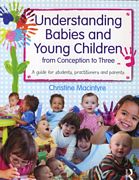
|
Understanding Babies and Young Children
from Conception to Three: a Guide for Students, Practitioners and Parents. Christine Macintyre, $44.95
Written to support ECE professionals,
this fascinating book explores the pre and post-natal development of children
from conception to three. It outlines the key aspects of progression,
discussing how innate and external factors combine to influence a child’s
well-being and abilities. Based upon exhaustive research in the field, but
written in a way that is relevant and lively to practitioners and students
alike, the text is organized in a question-and-answer format for quick and easy
referencing. |
Back to top
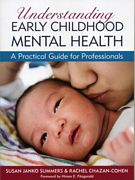
|
Understanding Early
Childhood Mental Health: a Practical Guide for Professionals. Susan
Janko Summers & Rachel Chazan-Cohen, $59.95
Integrating infant mental health
services into early education programs leads to better child outcomes and stronger
parent–child relationship. The big question is how to do it appropriately and
effectively. Clear answers are in this accessible textbook, created to prepare
early childhood professionals and programs to weave best practices in mental
health into their everyday work.
This introductory text is a primer
on infant mental health, strengthening the reader's knowledge of key issues
such as screening and assessment, attachment, emotional dysregulation and
aggression, risk and resilience, maternal depression, and children's exposure
to trauma. The book also includes practical, research-based guidance that can
be used to recognize indicators of mental health problems in very young
children, including emotional dysregulation and behavioral and developmental
changes. |
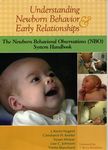
|
Understanding
Newborn Behavior & Early Relationships: the Newborn Behavioral
Observations (NBO) System Handbook. J. Kevin Nugent, Constance
Keefer, Susan Minear, Lise Johnson, & Yvette Blanchard, $72.50
Giving babies a “voice” helps parents
understand their baby’s unique strengths and needs. This observational
tool and handbook, complete with beautiful four-color photographs
by a Pulitzer prize-winning photographer, gives professionals a
systematic way to help parents respond with confidence to their
baby’s individual needs—and build positive parent-professional relationships
in the process. Flexible, easy to integrate into everyday practice,
and based on more than 25 years of research … this system is just
what clinicians in hospital, clinic, or home settings need to help
new mothers and fathers get to know their baby, increase their confidence
and competence as parents, and support their child’s growth and
development. |
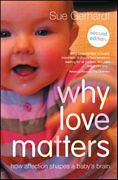
|
Why Love Matters: How Affection Shapes a Baby's Brain,
2nd Edition. Sue Gerhardt, $37.50
Why Love Matters explains why loving
relationships are essential to brain development in the early years, and how
these early interactions can have lasting consequences for future emotional and
physical health. This second edition follows on from the success of the first,
updating the scientific research, covering recent findings in genetics and the
mind/body connection, and including a new chapter highlighting our growing
understanding of the part also played by pregnancy. Sue Gerhardt focuses in
particular on the wide-ranging effects of early stress on a baby or toddler’s
developing nervous system. When things go wrong with relationships in early
life, the dependent child has to adapt; what we now know is that his or her
brain adapts too. The brain’s emotion and immune systems are particularly
affected by early stress and can become less effective. This makes the child
more vulnerable to a range of later difficulties such as depression,
anti-social behaviour, addictions or anorexia, as well as physical illness.
Why Love Matters is an accessible, lively,
account of the latest findings in neuroscience, developmental psychology and
neurobiology – research which matters to us all. It is an invaluable and hugely
popular guide for parents and professionals alike. |
Back to top
|
The Wiley-Blackwell Handbook of
Childhood Cognitive Development, 2nd Edition. Usha Goswani, Editor, $56.95
This definitive volume is the result of
collaboration by top scholars in the field of children's cognition. This new
edition:
- Offers an up-to-date overview of all the major
areas of importance in the field, and includes new data from cognitive
neuroscience and new chapters on social cognitive development and
language
- Provides state-of-the-art summaries of current
research by international specialists in different areas of cognitive
development
- Spans aspects of cognitive development from
infancy to the onset of adolescence
- Includes chapters on symbolic reasoning, pretend
play, spatial development, abnormal cognitive development and current
theoretical perspectives
|
|
Your Self-Motivated Baby: Enhance Your Baby's Social
and Cognitive Development in the First Six Months of Life through Movement. Beverly
Stokes, $32.49
A hands-on guide for communicating with babies in their
first six months and nurturing their physical, social, and cognitive
development, Your Self-Motivated
Baby shows parents and other caregivers how to interact with very young infants
and understand what they are expressing in their movements. Color photographs
throughout the book show babies' motivation in play and how subtle interactions
build bonding and encourage development. Following advice from author Beverly
Stokes, a seasoned developmental movement educator, adults learn how to relate
to babies and communicate effectively with them. Beverly Stokes makes it clear
that preverbal babies are giving cues for caregiver participation very early
on; it's up to us to try to understand them better. By communicating with
babies sensitively in the first six months of their lives, we help them to
establish the foundation for a healthy, confident, and joyful life. |
Back to top
Complete
Booklist
Infant
& Child Development
Amazing Baby. Desmond Morris, $24.95
The Amazing Infant. Tiffany Field, $39.99
The Attachment Connection: Parenting a Secure & Confident
Child Using the Science of Attachment Theory. Ruth Newton, $24.95
Babies in Mind: Understanding Your Baby’s Psychological
Needs. Jenny Perkel, $20.95
The
Baby in the Mirror: a Child’s World from Birth to Three.
Charles Fernyhough, $27.95
Becoming Attached: Unfolding the Mystery of the Infant-Mother
Bond and Its Impact on Later Life. Robert Karen, $29.50
Born for Love: Why Empathy is Essential — and Endangered.
Maia Szalavitz & Bruce Perry, $19.99
The Brightening Glance: Imagination and Childhood.
Ellen Handler Spitz, $19.95
Caring for Infants and Toddlers in Groups:
Developmentally Appropriate Practice (2nd Edition). ZERO TO THREE,
$43.95
Child Development for Child Care and Protection
Workers. Brigid Daniel et al, $39.95
Child Development: a Practitioner's Guide, 3rd Edition.
Douglas Davies, $71.95
Child Development: Theories and Critical Perspectives,
2nd Edition. Rosalyn Shute & Phillip Slee, $75.95
The Child: an Encyclopedic Companion from Birth through
Adolescence. Richard Shweder, Editor in Chief, $90.50
Child: How Children Think, Learn and Grow in the Early Years. Desmond Morris, $35.99
Communicating with Children Birth to Four Years. Debbie
Chalmers, $50.30
The Cultural Nature of Human Development. Barbara Rogoff,
$37.95
The Developing Brain Birth to Age Eight. Marilee
Sprenger, $25.95
The Developing Mind: How
Relationships and the Brain Interact to Shape Who We Are, 2nd Edition. Daniel Siegel, $54.50
From Birth to Five Years: Children’s Developmental
Progress, 4th Edition. Ajay Sharma & Helen Cockerill, $37.50
From Neurons to Neighborhoods: the Science
of Early Childhood Development. J. Shonkoff & D. Phillips (eds), $51.95
Honoring Diversity: a Cross-Cultural Approach
to Infant Development for Babies with Special Needs, 2nd Edition. Madeleine
Greey, $21.00
How the Child’s Mind Develops, 2nd Edition. David Cohen, $42.95
How Infants Know Minds. Vasudevi Reddy, $29.95
How Language Works: How Babies Babble, Words
Change Meaning and Languages Live or Die. David Crystal, $22.00
Human Behavior, Learning and the Developing
Brain: Volume 1, Typical Development. Edited by Donna Coch, Kurt Fischer
& Geraldine Dawson, $59.95
Human Behavior, Learning and the Developing
Brain: Volume 2, Atypical Development. Edited by Donna Coch, Geraldine
Dawson & Kurt Fischer, $59.95
The Infant Mind: Origins of the
Social Brain. Edited by Maria Legerstee, David
Haley & Marc Bornstein, $90.95
Learning to Read the World: Language and Literacy
in the First Three Years. Sharon Rosenkoetter & Joanne Knapp-Philo,
editors, $45.95
The Long Shadow of Temperament. Jerome Kagan & Nancy Snidman, $24.95
The Neurobehavioral and Social-Emotional Development
of Infants and Children. Ed Tronik, $68.50
Respecting Babies: a New Look at Magda Gerber’s RIE Approach. Ruth Anne Hammond, $34.50
Science in the Service of Children, 1893 -
1935. Alice Boardman Smuts, $38.25
Socioemotional Development in the Toddler Years:
Transitions & Transformations. Celia Brownell & Claire Kopp, $71.95
The Temperament Perspective: Working with Children’s Behavioral
Styles. Jan Kristal, $36.50
Theories of Attachment: an Introduction to Bowlby, Ainsworth,
Gerber, Brazelton, Kennell & Klaus. Carol Garhart Mooney, $28.95
Theories of Infant Development. Gavin Bremner
& Alan Slater, editors. $49.50
A Therapist's Guide to Child Development: the
Extraordinarily Normal Years. Edited by Dee Cray, $62.50
Understanding Babies and Young Children
from Conception to Three: a Guide for Students, Practitioners and Parents. Christine Macintyre, $44.95
What Children Need. Jane Waldfogel, $25.50
Why Love Matters: How Affection Shapes a Baby’s Brain.
Sue Gerhardt, $23.95
Young Children's Personal, Social & Emotional
Development, 3rd Edition. Marion Dowling, $45.95
Your Child's Development: 9 Age-based Handouts
Providing Information and Guidance on Behavior and Development, Birth
to 3. Zero to Three National Centre for Infants, Toddelrs and Families,
$23.50
Back to top
Assessment
& Intervention
An Activity-Based Approach to Developing Young Children’s
Social Emotional Competence. Jane Squires & Diane Bricker, $39.95
Assessment of Childhood Disorders, 4th Edition.
Eric Mash & Russell Barkley, $52.95
Early Intervention with Multi-Risk Families: an Integrative
Approach. Sarah Landy & Rosanne Menna, $60.50
Goodness of Fit: Clinical Applications from
Infancy through Adult Life. Stella Chess & Alexander Thomas, $43.50
Handbook of Attachment: Theory, Research, and Clinical
Applications, 3rd Edition. Edited by Jude Cassidy & Phillip Shaver,
$63.95
Handbook of Preschool Mental Health: Development,
Disorders and Treatment. Joan Luby, editor, $75.95
Handbook of Infant Mental Health, 3rd Edtion. Charles Zeanah
(ed), $50.50
Handbook of Self-Regulation,
2nd Edition: Research, Theory, and Applications. Edited by Roy Baumeister
& Kathleen Vohs, $64.95
Infant and Early Childhood Mental Health: a Comprehensive
Developmental Approach to Assessment and Intervention. Stanley Greenspan
& Serena Wieder, $95.95
Mental Health in Early Intervention: Achieving Unity in
Principles and Practice. Gilbert Foley & Jane Hochman, $57.95
Mind to Mind: Infant Research, Neuroscience
and Psychoanalysis. Edited by Elliot Jurist, Arietta Slade & Sharone
Bergner, $40.00
Transdisciplinary Play-Based Assessment 2: a Functional
Approach to Working with Young Children. Toni Linder, $69.95
Transdisciplinary Play-Based Intervention 2: Guidelines
for Developing a Meaningful Curriculum for Young Children. Toni Linder,
$64.50
Understanding Early Childhood Mental Health: a Practical
Guide for Professionals. Susan Janko Summers & Rachel Chazan-Cohen,
$59.95
Understanding Newborn Behavior & Early
Relationships: the Newborn Behavioral Observations (NBO) System Handbook.
J. Kevin Nugent, Constance Keefer, Susan Minear, Lise Johnson, & Yvette
Blanchard, $69.95
Back to top
Working with Families
Bright Futures: Guidelines for Health Supervision
of Infants, Children, and Adolescents, 3rd Edition. American Academy of Pediatrics, $56.95
Charting the Bumpy Road of Coparenthood: Understanding
the Challenges of Family Life. James McHale, $39.50
Childhood in a Global Perspective. Karen Wells,
$29.95
Cross-Cultural Caring: a Handbook for Health
Professionals, 2nd edition. Nancy Waxler-Morrison et al, $34.95
Developing Cross-Cultural Competence: a Guide for Working
with Children and Their Families, 4th Edition. Eleanor Lynch & Marci
Hanson, $59.95
Enhancing Early Emotional Development: Guiding
Parents of Young Children. Jean Gowen & Judith Nebrig, $30.95
Evidence-Based Practice in the Early Childhood Field. Virginia
Buysse & Patricia Wesley, Editors, $37.95
Home Visitor’s Guidebook: Promoting Optimal Parent &
Child Development, 3rd Edition. Carol Klass, $49.50
Learning to Listen: a Life Caring for Children. T. Berry Brazelton, $27.50
Lifeskills Progression (LSP): An Outcome and
Intervention Planning Instrument for Use with Families at Risk. Linda
Karen Kurz-Riemer, $46.50
Pathways to Competence: Encouraging Healthy Social and
Emotional Development in Young Children, 2nd Edition. Sarah Landy,
$89.95
Pathways to Competence for Young Children: a Parenting
Program (Book and CD-ROM). Sarah Landy & Elizabeth Thompson, $79.95
Pathways to Positive Parenting: Helping Parents
Nurture Healthy Development in the Earliest Months. Jolene Pearson, $55.50
Promoting Healthy Childhood Development Today.
James Harris, $21.95
Understanding Newborn Behavior & Early
Relationships: the Newborn Behavioral Observations (NBO) System Handbook.
J. Kevin Nugent, Constance Keefer, Susan Minear, Lise Johnson, & Yvette
Blanchard, $72.50
The Wiley-Blackwell Handbook of
Childhood Cognitive Development, 2nd Edition. Usha Goswani, Editor, $56.95
Your Guide to Nurturing Parent-Child Relationships: Positive
Parenting Activities for Home Visitors. Nadia Hall
et al, $69.50
Your Self-Motivated Baby: Enhance Your Baby's Social
and Cognitive Development in the First Six Months of Life through Movement. Beverly
Stokes, $32.49
Back to top
Selected
Resources from Zero to Three
Being in Charge: Reflective Leadership in Infant/Family
Programs. Rebecca Parlakian & Nancy Seibel, $15.50
Bringing Up Baby: Three Steps to Making Good
Decisions in Your Child’s First Years. Claire Lerner & Amy Laura Dombro,
$18.95
Building Strong Foundations: Practical Guidance
for Promoting the Social-Emotional Development of Infants and Toddlers.
Rebecca Parlakian & Nancy Seibel, $18.50
Diagnostic Classification 0-3: Diagnostic Classification
of Mental Health and Developmental Disorders of Infancy and Early Childhood.
Serena Wieder (ed), $97.95
Home Visiting: Reaching Babies and Families
“Where They Live”. $9.50
How Culture Shapes Social-Emotional Development:
Implications for Practice in Infant-Family Programs. Monimalika Day &
Rebecca Parlakian, $20.50
Learning & Growing Together: Understanding
and Supporting Your Child’s Development. Clair Lerner & Amy Dombro, $15.50
The Power of Questions: Building Quality Relationships
with Families. Rebecca Parlakian, $11.50
Reflective Supervision in Practice: Stories from the Field.
Rebecca Parlakian (ed), $43.95
Sensory Integration and Self-Regulation in Infants and
Toddlers: Helping Very Young Children Interact with Their Environment.
G. Gordon Williamson & Marie Anzalone, $24.95
Back to top
Resources for
Parents
Active Baby, Healthy Brain: 135 Fun Exercises and Activities
to Maximize Your Child's Brain Development from Birth through Age 5½.
Margaret Sassé, $23.95
Amazing Babies: Essential Movement for Your
Baby in the First Year. Beverly Stokes, $16.95 - DVD, $29.95 (47 mins.)
Amazing Minds: from Newborns to Toddlers. Jan Faull & Jennifer McLean Oliver, $18.50
Amazing Toddlers: Moving, Communicating, Learning.
Beverly Stokes, $16.95 - DVD, $29.95 (39 minutes)
Attachment Parenting: Instinctive Care for
Your Baby and Young Child. Betsy Kennedy, $17.99
The Baby Book: Everything You Need to
Know About Your Baby from Birth to Age Two, Revised 2013. William Sears, Martha Sears, Robert Sears & James Sears, $29.00
Baby’s Best Chance: Parent’s Handbook of Pregnancy
and Baby Care, 6th Edition. Province
of British Columbia, Ministry for Children and
Families, $15.95
Becoming the Parent You Want To Be: a Sourcebook
of Strategies for the First Five Years. L. Davis & J. Keyser, $29.00
Better Baby Food: Your Essential Guide to Nutrition,
Feeding & Cooking for All Babies & Toddlers. Daina Kalnins &
Joanne Saab, HSC, $24.95
Better Sleep for Your Baby & Child: a Parent’s
Step-by-Step Guide to Healthy Sleep Habits. Shelly Weiss, HSC, $24.95
Canada
’s
Baby Care Book: a Complete Guide from Birth to 12 Months Old. Jeremy Fri8edman
& Norman Saunders, HSC, $34.95
Complete Book of Mother & Baby Care from Conception to 3 Years, 3rd Edition. CMA (Canadian Medical Association), $30.00
The Emotional Life of the Toddler. Alicia Lieberman, $15.95
First Aid for Babies and Children—Fast: Emergency Procedures
for All Parents and Caregivers. Johns
Hopkins
Children’s Center, $21.75
The Fussy Baby Book: Parenting Your High-Need Child From
Birth to Age Five. William Sears & Martha Sears, $19.50
Handbook of Self-Regulation, 3rd Edition: Research,
Theory, and Applications. Edited by Roy Baumeister & Kathleen
Vohs, $117.50
The Happiest Baby on the Block: the New Way to Calm Crying
and Help Your Newborn Baby Sleep Longer, 2nd Edition.
Harvey
Karp, $21.00; DVD format $30.98; Happiest Toddler $19.00; DVD format $30.98
The Human Spark: the Science of Human
Development. Jerome Kagan, $32.00
Is This a Phase? Child Development & Parent
Strategies, Birth to 6 Years. Helen Neville, $29.95
Love and Limits: Guidance Tools for Creative Parenting.
Elizabeth Crary, $11.95
Mind in the Making: the Seven Essential Life Skills Every
Child Needs. Ellen Galinsky, $21.00
Back to top
Our Babies, Ourselves: How Biology and Culture
Shape the Way We Parent. Meredith Small, $21.00
Parenting From the Inside Out: How a Deeper Self-Understanding
Can Help You Raise Children Who Thrive. Daniel Siegel, $23.00
The Philosophical Baby: What Children’s Minds Tell
Us about Truth, Love and the Meaning of Life. Alison Gopnik, $19.00
Raising a Secure Child: How Circle of Security
Parenting Can Help You Nurture Your Child's Attachment, Emotional Resilience,
and Freedom to Explore. Kent Hoffman, Glen Cooper & Bert Powell, $21.95
Reading with
Babies, Toddlers and Twos: a Guide to Choosing, Reading and Loving Books
Toget her. Susan Straub & KJ Dell’Antonia, $22.95
Smart Medicine for a Healthier Child: a Practical A-to-Z
Reference to Natural and Conventional Treatments for Infants & Children.
Janet Zand et al, $28.50
Surviving Your Preschooler: 365 Activities
for Two to Five-Year-Olds Using Mostly Things You Have at Home. Trish
Kuffner. $18.95
Surviving Your Toddler: 365 Creative Games
and Activities to Help You Enjoy the Unique Challenges of Life with a
One-to-Three-Year-Old. Trish Kuffner, $18.95
Time-in Parenting: How to Teach Children Emotional
Self-Control, Life Skills, and Problem Solving by Lending Yourself and
Staying Connected. Otto Weininger, $16.95
Touchpoints: Your Child’s Emotional and Behavioral
Development Birth to Three., 2nd Edition. T. Berry Brazelton & Joshua
Sparrow, $21.50
Touchpoints: Three to Six. T. Berry Brazelton and Joshua
Sparrow, $23.00
Why Love Matters: How Affection Shapes a Baby's Brain,
2nd Edition. Sue Gerhardt, $37.50
Back to top

Didn't
find it...?
Not sure...?
Need a suggestion...?
There are over 10,000 titles listed on our website and more than 35,000 titles in our inventory. If you haven't found what you want on the website — and it's one of our specialties — chances are good that we carry it, or can get it for you. Just let us know what you're looking for.
Call us toll-free 1-800-209-9182
or e-mail
PARENTBOOKS
is pleased to invoice institutions. Please inquire regarding terms and
discounts. Shop in person, by phone, fax, mail or e-mail . VISA, Mastercard
and Interac are welcome. We are open from 10:30 to 6:00 Monday through Friday and from 11:00 to 5:00 on Saturday.
 All prices are in Canadian dollars
and are subject to change without notice. All prices are in Canadian dollars
and are subject to change without notice.

|